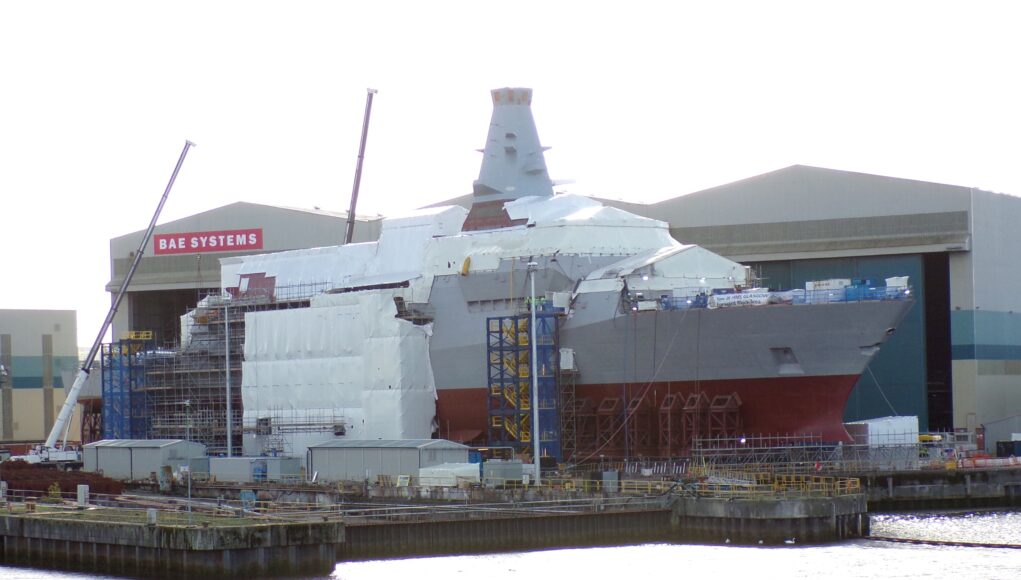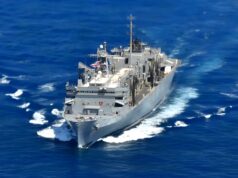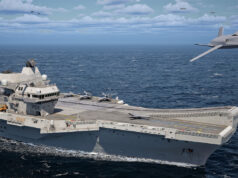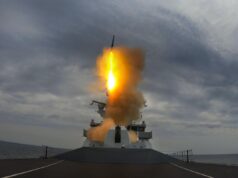The UK Defence Journal was contacted by a source at BAE’s shipyards who said staff were told this week that up to 116 management roles will be cut across its Naval Ships business.
This has now been confirmed.
According to the source, BAE Systems Managing Director Sir Simon Lister told executives at a Tuesday morning meeting that around 15% of management roles will be shed.
The news comes less than a week after BAE announced a landmark £10 billion deal to build anti-submarine frigates for Norway on the Clyde, an order hailed as one of the most significant shipbuilding exports in decades. Despite this, the company appears to be restructuring its management at a time when its overall order book and workforce are expanding.
We understand that the changes affect management positions across BAE’s Naval Ships business rather than shop-floor or production staff.
At the time of writing, BAE Systems had issued a statement in response to media enquiries. A spokesman said: “We’ve undertaken a review to consider how we reshape and modernise the operations of our naval ships business following considerable investment in our infrastructure in recent years.
Whilst we expect the overall size of the business to continue to grow, we’ll now commence consultation to potentially reduce our executive population by up to 116 roles. We’ll work alongside our employee representative groups to do everything we can to support our colleagues, including exploring potential opportunities in other areas of the company. In the meantime, our focus remains on delivering for our customers.”
The move, it is believed, reflects a wider push to modernise BAE’s naval operations, even as major contracts secure the long-term future of shipbuilding on the Clyde














Will they be replaced by Drones too ?
Nah,AI.
Bit difficult to get one’s head around this, if with almost unprecedented growth they can get rid of that many management positions now, what the hell were they doing over the past decade or so? Let’s hope there is some logic behind it, but history has taught me to always be nervous when British Industry makes almost any substantial decision of this nature that raises real questions. Let’s hope those who have had such a positive role in turning the naval business around who will be going.
Agreed.
Note it says executive-management roles.
I think its a lot of executive staff that have been picked up from merger and acquisitions that were given essentially non-jobs to avoid redundancy or were guaranteed continued employment as a condition of selling their shares.
Exactly what I meant but in better words.
Maybe the senior management decided that the junior management were getting in the way of efficient decision making?
Sort of like a microcosm of the MoD…
Agree with you.
Probably people getting paid for high paid jobs that aren’t needed or something. But like our military with more top brass than soldiers. That’s a slight exaggeration but the point still stands.
Babcock were pretty efficient at getting HMS Venturer built and floated.
Maybe BAE feel a bit embarrassed or threatened ?
Let’s see how the trials go.
Mind you Babcock did realise that building ships in a covered facility was cheaper and quicker than outside!
BAE had the means to build “Janet Harvey Hall” many years ago, yet again, it appears they are looking over their shoulder at Babcock.
All Babcock has done is put steel together, they’re hardly making complicated ships
And duplicated roles.
Shareholders (major investors) like such statements.
This is the power of AI generating new jobs … o wait …
I always think of Charlie’s dad in Charlie and the Chocolate Factory (or was is Willy Wonka?). By some minor miracle, the dad lost his old production line job but was fortunately qualified to maintain the machine that replaced all of the workers, so happy ending! Except that there were dozens of workers on that production line who were out of a job, and in the modern world there aren’t many people in lower-end jobs that are qualified to work maintain robots or computer systems.
I’m not saying we should abandon AI and the robot revolution in favour of keeping the working class employed; resistance to modernisation was one of the things that killed much of our heavy industry, along with overly powerful unions and poor government policy. However, serious consideration needs to be given to what to do with workers. Without work and income, you either need an idealised socialist state that still somehow motivates people to do the remaining work, or you need to have far fewer people around.
No idea why this is happening at BAe or for that matter why it’s so much of a news story in what is a very large enterprise. I went through this a few times and survived, there were others who knew that in a competitive environment they couldn’t compete and took the (usually) very generous VS payments.
It was a bit like shaking a fruit tree, some fell out because they were not strong enough and some had to be nudged.
On the other hand we went through one “reorg” that removed an entire level of the hierarchy, those in that band had 3 choices compete to go up, accept to go down or leave.
Daft thing was it was the right thing to do as fewer levels sped up decision making and released funds for investment.
Glad I’m all out of it now.
Management roles are expensive and made more expensive by recent NI rise. Management also tend to be non unionised so easier to down size.
Top heavy on management! It’s been this way for years but it takes a brave individual to tackle HR and the contracts, TORs head on. It becomes an expensive headache in the short-term.
There has to be a powerful commercial driver to this.
At a time when sales a booming to cut experience is strange but if the idea is the make the business more efficient and leaner then probably good.
There could be an element of once the ships are designed, sold and yard things set up different skill sets are need too.
Without understanding where these roles are in the org chart it is very hard to properly understand what is going on here!
So long as it isn’t just been done to squeeze a bit more profit out of the business a la Boeing. Boeing seriously shot themselves in both feet sacking so many experienced people that it compromised build safety. It doesn’t sound as if that is happening in this case, but I always get a bit nervous when an apparently successful business starts to swing the axe.
Success can go to some people’s head with dire consequences. My old firm QinetiQ bought a US business which turned out to be a very successful acquisition. Trouble is the guy at the top went and bought a few more US businesses which turned out to be poor acquisitions. Result 1,000 UK staff lost their jobs… including me. The guy at the top got a £100k per year contracting job at QinetiQ, not to mention millions in shares..! There really isn’t any justice in this world.
Cheers CR
The Ghost of Lord Weinstock enters the conversation …